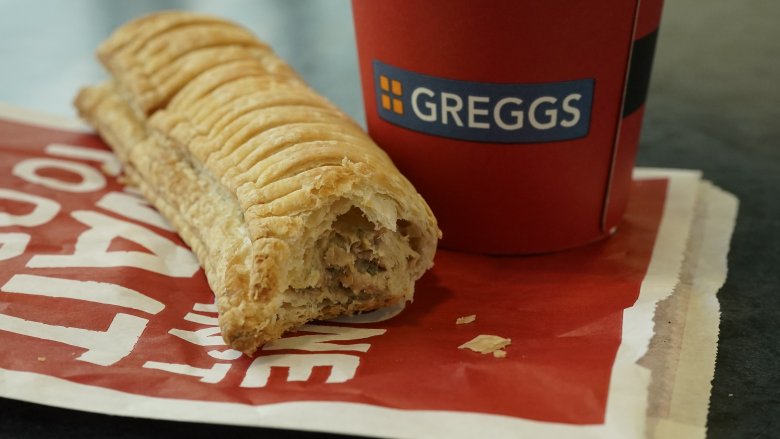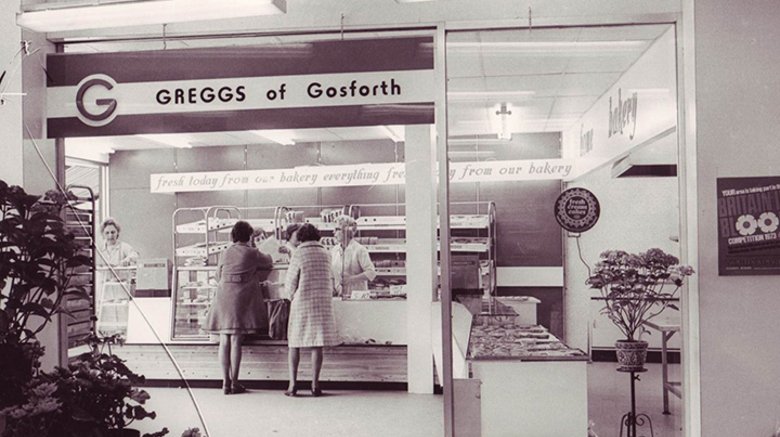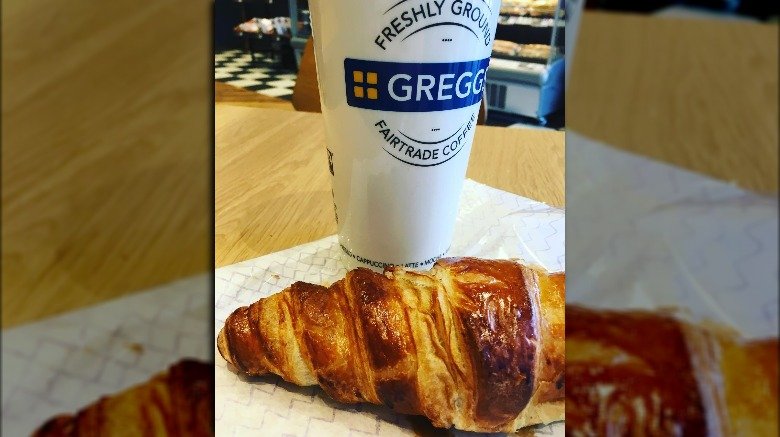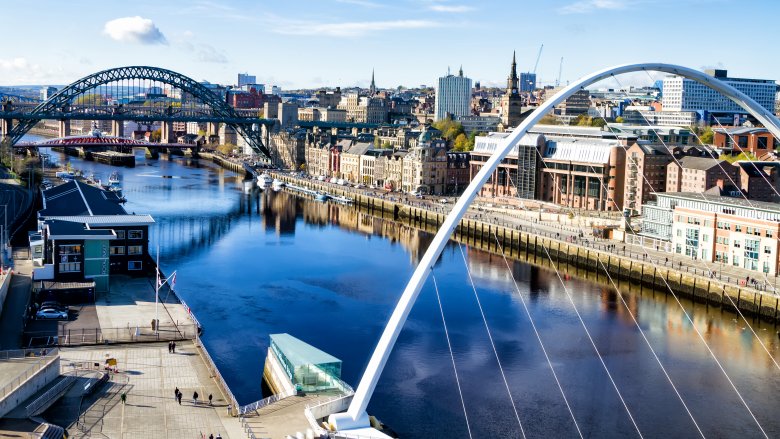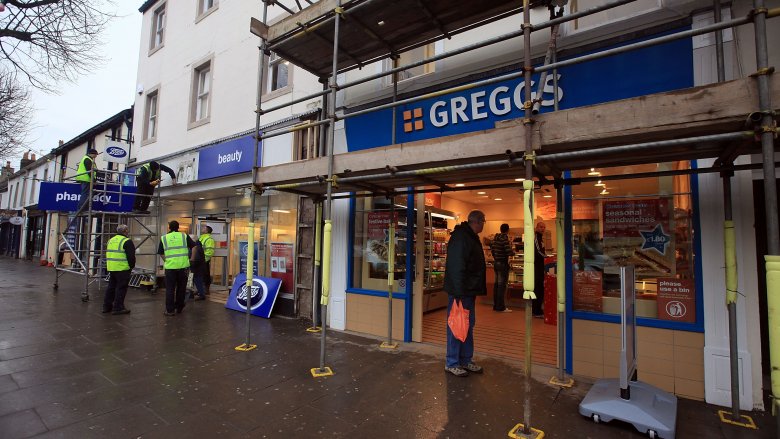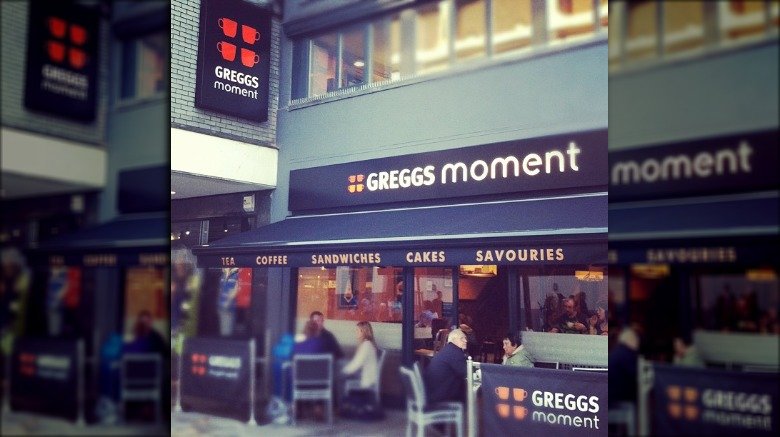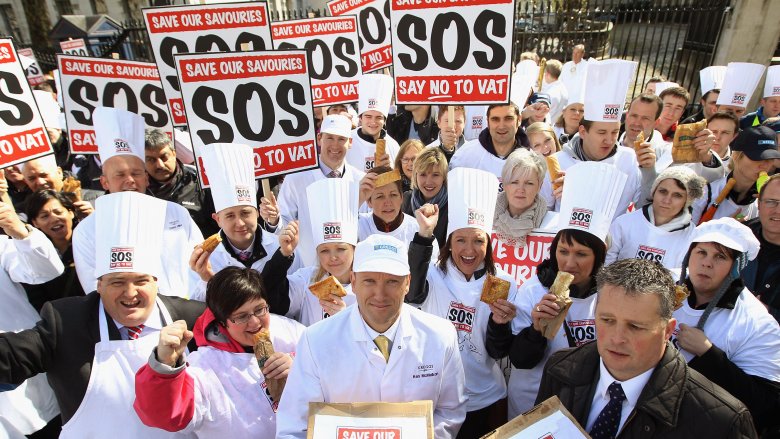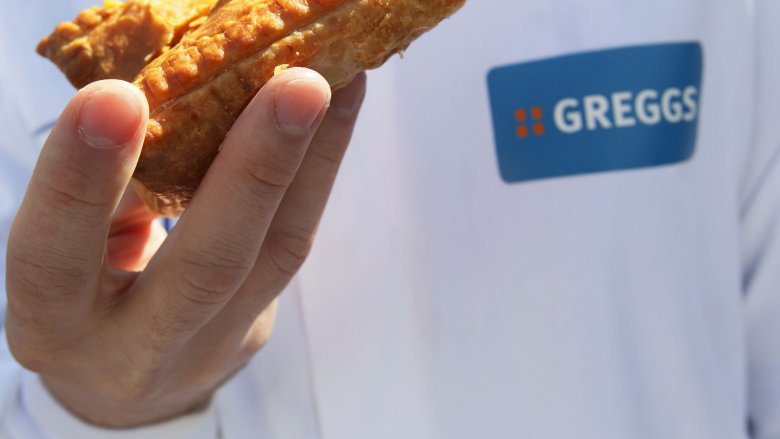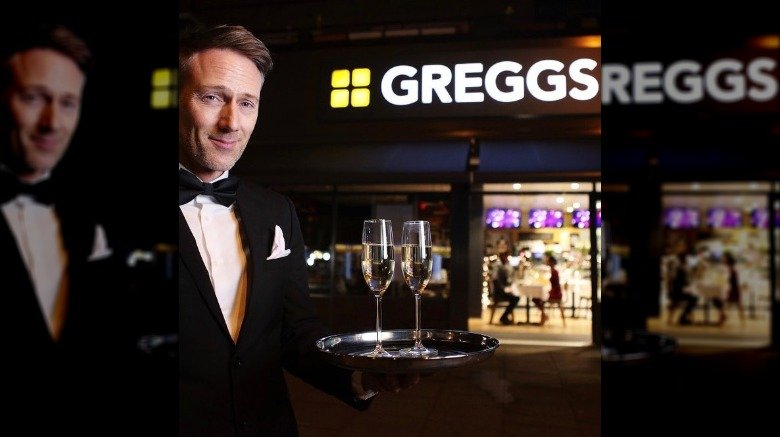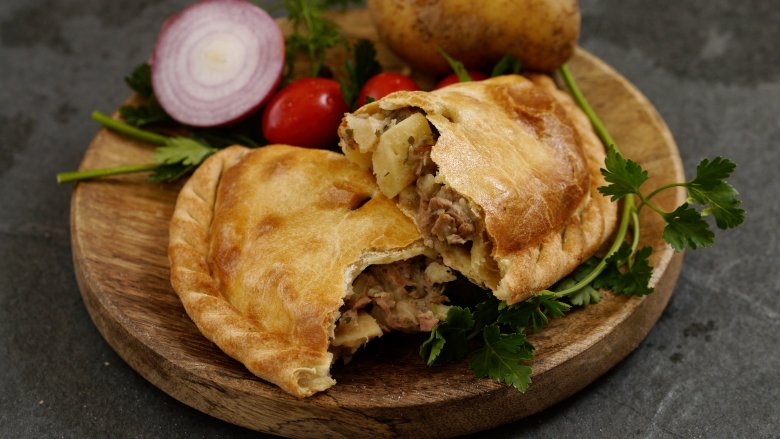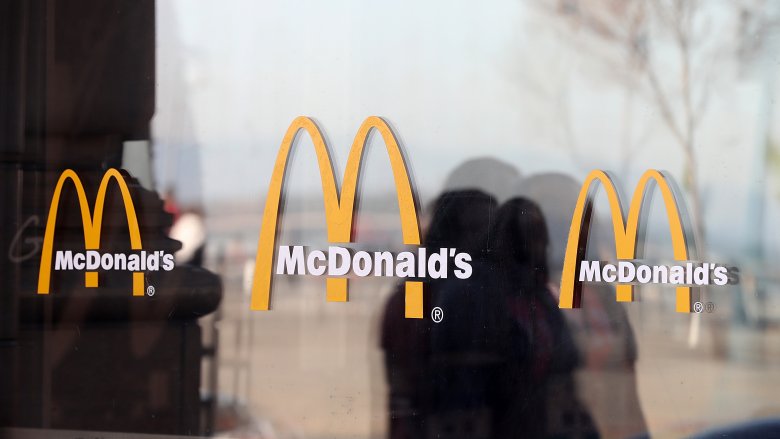The Untold Truth Of Greggs
Greggs is a peculiar thing. In case you don't know, it's a chain based in the United Kingdom that's basically half-bakery, half-sandwich shop. It made its name as a place to get decent, cheap grub such as bakes, pasties, sausage rolls, and donuts, and is particularly associated in the U.K. with the north of England, where it is a very, very popular place indeed.
In recent years, Greggs has pretty much conquered Britain. That's partly thanks to a positive public image — the company is well-known for its work on community projects and contributions to local charities, while staff are paid relatively well for their line of work. A slew of celeb fans, including Milla Jovovich, Thomas Turgoose, Jake Gyllenhaal and Cheryl Fernandez-Versini, haven't hurt, either. Perhaps most of all, however, it's down to the fact that English people really do like a good steak bake. From their humble beginnings, to their PR victories, to their clashes with the British government, this is the untold truth of Greggs.
They started small
Greggs began in 1939 as a simple door-to-door bakery round in Newcastle. Its aim, in those early days, was for founder John Gregg to provide bakery products such as yeast to the mining terraces in and around the city. It wasn't until over a decade later, in 1951, that the first Greggs store opened, and almost 20 years later the company hosted its first charitable event — a "pie n' peas supper" for the older residents of the town of Gateshead.
Over the next few decades, Greggs — and its charitable organization, the Greggs Foundation — became renowned throughout the north of England for its community work. It sponsored charity runs, offered grants to wildlife trusts and established the Greggs Breakfast Club, which was set up to ensure local children were given an adequate first meal of the day.
Meanwhile, the company itself went from strength to strength: its 500th store was opened in 1994, and today it runs over 1,850 branches throughout the U.K.
They're steering away from their bakery background
Greggs may have started as a bakery, but that's not quite what you'd call the modern iteration of the company. In fact, in recent years it's made a massive pivot away from the bakery brand towards a "food-on-the-go" image with the intention of satisfying the need for breakfast, lunch, and snacks rather than providing simple treats. Now, Greggs offers healthier options, sandwiches, salads, soups, yogurt, porridge, fruit pots, and drinks, rather than simply bakes, sweets, and sausage rolls.
That's not to say those items have been taken out of circulation at Greggs — far from it, in fact, and you'd be hard-pressed to find someone who associates the name with porridge rather than pasties. But some traditions have taken a hit as Greggs has stepped into this new world. Most notable of all of these is bread, which many of the chain's stores stopped selling in 2015, citing lack of consumer interest as the reason.
They're a really big deal in some places
One important thing to know about Greggs is that it's a seriously big deal to folks in the north of England. Like, a proper, genuine, really big deal. It's the kind of big deal that means a government minister in charge of the northern economy can stir up controversy just by saying he doesn't like their sausage rolls. Or that student newspapers can set out a clear definition of the English north by mapping out Greggs locations around the country.
Within the north itself, the undisputed capital of Greggs is its hometown, Newcastle. The city is home to 29 Greggs stores — which might not seem like many if you're used to living in some sprawling metropolis, but for a city as small as Newcastle that's quite a lot. In fact, it's 9.9 outlets for every 100,000 people who live there, and that also means you're three times as likely to come across one in Newcastle than anywhere else in the U.K. Oh, and the place with the third most number of Greggs stores happens to be Gateshead, which is situated right on the other side of the river from Newcastle. And second place? West Dunbartonshire, in Scotland. We're not sure why.
But they haven't caught on everywhere
Greggs may be a very English entity, but that's not to say the company hasn't attempted to go global in the past. Unfortunately, these efforts haven't really worked out — the store's only foray into the international market ended with a whimper in 2008 when the company was forced to admit defeat and close the stores it had opened in Belgium. In 2015, Greggs opened its first store in Northern Ireland, but that's about as far as it's gotten. Ask the people in charge, and they'll tell you that there simply isn't any global demand for pasties and sausage rolls — which, let's face it, is basically true.
Even in certain places within the U.K., Greggs has struggled to get a foothold, mostly in places like airports airports (because they're too affordable for airports' tastes, apparently). They've also suffered from troublesome rent costs in London. Sadly, it seems like Greggs is destined to stay stuck on the British high street.
They tried to go fancy
In 2011, Greggs tried to take on the coffee shop heavyweights which had long made their names on British streets, such as Costa Coffee and Starbucks. They did this with Greggs Moment, a coffee shop opened on the 60th anniversary of the foundation of Greggs' first store. Within its "modern, contemporary environment," customers could experience something wholly unlike what Greggs was known for: customizable sandwiches, focaccias, paninis and wraps, "gourmet square pies," fancy breakfasts, and of course, coffee.
It was a nice idea, but it didn't go too well. The Greggs Moment idea ended up failing, with the only legacy of the experiment being a gradual move towards trendier and more fashionable store design schemes. Today, the Gosforth Greggs boasts exposed brick, great wi-fi, and plenty of knick-knacks hung on the walls, but don't go thinking you're going to be getting your own custom-made artisan square pie with all that pizzazz.
They had beef with Piers Morgan
In early 2019, Greggs hit headlines around the world after it stirred up a bunch of not-entirely-warranted controversy with the release of its vegan sausage roll. In the wake of the company's announcement of their new meat-free roll, notorious offence-taker and television personality Piers Morgan took up arms against Greggs for this, tweeting: "Nobody was waiting for a vegan bloody sausage, you PC-ravaged clowns."
Greggs' response to Morgan ("Oh hello Piers, we've been expecting you") and to other similarly offended accounts made them the talk of Twitter for at least a few days, and gave the vegan sausage roll more publicity than the company's initial post could ever have done. So much so, in fact, that Greggs fans were left distraught after they showed up hoping to purchase one and see what the fuss was all about — and found that they'd sold out. Not exactly a PR disaster for Greggs, but we're not sure you could say the same for Morgan.
And then there was Pasty-gate
In 2012, the U.K. was deep in the midst of the Conservative government's austerity programme, a series of highly controversial policies meant ostensibly to repair the country's fragile economy in the wake of the 2008 financial crisis. It was during this time that Greggs found itself embroiled in a battle against the government, when, as part of the austerity budget for that year, Chancellor George Osborne introduced a tax hike of 20 percent on hot takeout snacks — which included pasties.
What became known as the "pasty tax" pretty much constituted a scandal. Some criticized it as an act of class warfare, on the basis that most people who enjoyed the foods hit by the tax were of a lower socioeconomic class. Things weren't helped when Osborne admitted in Parliament that he couldn't remember the last time he had eaten a bake from Greggs. Eventually, the government was forced into a humiliating climbdown, and a concession was allowed in which pasties and other bakery items were made exempt from the tax if they were allowed to cool down after removal from the oven.
They had their own TV series
What could possibly be better than tucking into a hot, fresh steak bake? Why, watching someone make one on camera, of course. Luckily, that's exactly what you can do with Greggs: More Than Meats The Pie, a documentary series about the company which aired in 2013. It followed Greggs staff members and workers around the U.K. as they each went about their assorted jobs. One episode, for example, focused on the Newcastle-based plant which creates the chain's sausage rolls. Another saw a branch in Southend-on-Sea afflicted by a horde of raucous pigeons. Dramatic stuff, you understand.
According to a review in The Guardian, "there's literally no grumbling, no engineered antagonism, posturing or sneering; only industrious sorts in hairnets calling sausage rolls "my little soldiers," shots of glazed buns soundtracked by Led Zeppelin's 'Kashmir.' and the sort of cheerily naff parochialism that tends to inspire a faint, generalized proud-to-be-Britishness." What's not to love?
There was a Greggs Marathon
Yeah, we did say they take Greggs seriously in Newcastle. In 2018, three teenagers from the city decided to run their own charity marathon through the city, passing every single one of its 29 branches of Greggs along the way.
Matthew Bradbury, one of the trio, told the Chronicle Live (via Runner's World) that their run "started off as a laugh just because we go to Greggs quite often. I've probably eaten my body weight in stotties and who knows how many sausage rolls we have had over the years [...] We then had this daft idea to visit every Greggs in Newcastle in a day and we thought we could do this for the Greggs Hardship Fund, which is a worthy cause, and started telling people about it."
The marathon ended up reaching an impressive 27 miles around Newcastle, a route which was specifically designed to look like a squirrel on a GPS. In the end, they raised around £1,000 (about $1,300) for charity and were rewarded a pastry each by Greggs for their efforts.
They take Valentine's Day pretty seriously
For Valentine's Day 2018, Greggs offered something a little different for any would-be lovers who'd decided to stop by their stores. Valentine's diners would enjoy a full four-course meal of Greggs classics — and naturally, the whole thing came with a couple glasses of prosecco, too. Not only that, but the interiors of the five U.K. stores that participated were transformed into fine dining environments, including mood lighting, music, roses, candelabras, and white linen tablecloths. Full table service too, of course. You wouldn't expect anything less, would you?
The full menu began with an array of canapés such as pork and puff pastry sliders, steak and blue cheese en croute, katsu tortilla wraps, Mexican chicken chipotle spoons, béchamel toasted honey cured ham squares and tomato gazpacho. Mains were a choice of any classic baked-to-order Greggs pastry with spiced potato slices, fresh Apollo and spinach leaves and sunblush tomatoes. Finally, dessert came in the form of a brochette of miniature donuts with a butterscotch dipping sauce, and the whole thing was topped off with a Belgian dark chocolate brownie, raspberry and almond bite and a caramel shortbread. Try taxing that, Osborne.
Mapping out their empire is impressive
A few years ago, CityMetric shared a map on social media of each and every Greggs branch in the U.K. While the sheer number of stores in the country was remarkable enough (and we'll come to that shortly) the map revealed a few other interesting aspects of the company that even the most hardened Greggs veterans might not have known.
For one, there's the existence of what's known as the "second-hand Greggs." These outlets, which are fairly rare, sell day-old goods at greatly reduced prices. Their signage is red (rather than the traditional blue) and they're marked with the words "bakery outlet." The map also revealed that there are very, very few Greggs in the southwest of England — just a handful in Devon and only one in Cornwall. Any Brit will be able to tell you why that is: because a certain type of pasty (known as the Cornish pasty) is an iconic part of the region's culinary scene, and the "fiercely traditional" Cornish might be a little hostile to the idea of a northern chain company barging into their territory. Honestly, we can't blame them.
They're bigger than McDonald's (somewhere)
At this point, you've probably got a decent idea as to the scale of Greggs' success in the U.K. But let's put it into perspective. We know Greggs has somewhere around 1,850 stores in its home country. By comparison, there are approximately 1,300 McDonald's restaurants situated in the U.K. That means, by number of outlets, Greggs is actually bigger in Britain than McDonald's. The same McDonald's which basically rules the world.
There are few chains that have got the edge on Greggs, in fact. One is Costa Coffee, which, as of 2017, owned 2,389 U.K. stores, while another is Subway, which opened its 2000th store in the U.K. and Ireland back in 2015. Aside from that, however, you'll find few major companies which have quite managed to match the sheer degree of success that Greggs has achieved. Not bad for a door-to-door bakery round.
